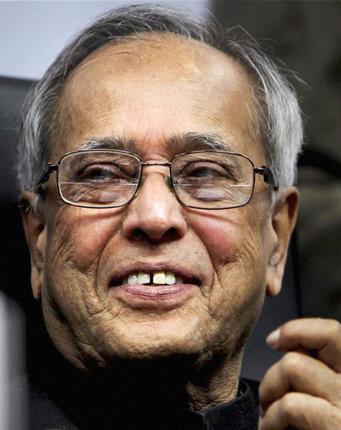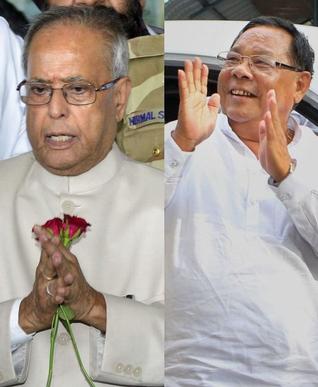
New Delhi, July 22: Pranab Mukherjee was today elected as the 13th President, marking a new journey for the veteran Congress leader after over four decades of life in active politics.
Mukherjee, UPA nominee, got 5,64,469 vote value, well beyond the half-way mark of 5,25,140 in an electoral college of over 10.5 lakh when counting of votes polled by the MPs and MLAs of 20 of the 30 states was completed.
His rival P A Sangma, who was backed by BJP and some other opposition parties like AIADMK and BJD, could manage only 2,57,466 vote value, according to Rajya Sabha Secretary General V K Agnihotri, who is the Returning Officer for the poll.
Mukherjee, 76-year-old Congress leader, brings to the top Constitutional post a wealth of experience as he has held key positions in the party and government, including holding the portfolios of Finance, Defence and External Affairs.
He established a clear lead right from the beginning when counting of votes of MPs completed and maintained it across the states, except the BJP-ruled ones. He sprang a surprise in BJP-ruled Karnataka where he got the votes of 117 MLAs against BJP's 103 in the 224-member Assembly.
Out of 748 MPs, who had voted, he secured 527 votes with a value of 3,73,116 against 206 for Sangma which has a value of 1,45,848.
Fifteen votes including that of SP chief Mulayam Singh Yadav were invalid. Of these, nine were to be in favour of Mukherjee while six for Sangma.
Voting for the Presidential election took place on July 19. The electoral college for the poll comprises MPs and MLAs.
Earlier report
Pranab Mukherjee voted India's 13th President
New Delhi, July 22: UPA nominee Pranab Mukherjee got the overwhelming support of Parliamentarians in the President's election securing a vote value of 3,73,116.
In 68-member Himachal Pradesh Assembly, Mukherjee got 23 votes while Sangma won 44 votes. One vote was invalid. Mukherjee's vote value was 1173 while it was 2244 for Sangma.
Jammu and Kashmir gave Mukherjee 68 votes while Sangma got 15 votes. Two votes were declared invalid. Mukherjee's vote value here stands at 4896 while Sangma got 1080. The Assembly has 87 MLAs.
In 81-member Jharkhand Assembly, Mukherjee got 60 votes while Sangma won 20. Mukherjee's vote value is 10560 while Sangma's stands at 3520.
Pranab Mukherjee led Jammu and Kashmir and surprisingly in Jharkhand where BJP shares power with JMM. In BJP-ruled Himachal Pradesh Mukherjee trailed as expected.
There has been apparent cross-voting in Karnataka where BJP runs a government. UPA candidate Pranab Mukherjee got the majority votes in the 224 member Assembly with 117 MLAs voting for him. Sangma could get only 103 votes while three votes were invalid. One MLA did not vote.
The value of votes polled by Mukherjee was 15327 while it was 13493 for Sangma.
Mukherjee's lone rival P A Sangma, supported by some opposition parties, including BJP, managed to get a vote value of only 1,45,848 in the counting of votes which is in progress at Parliament House, official sources said.
A total of 748 MPs voted in the election on July 19. Of the total votes, Mukherjee got 527 votes while Sangma got 206. Fifteen votes including that of SP chief Mulayam Singh Yadav were invalid.
Counting of ballots began amidst tight security in Parliament House here in the presence of authorised representatives of both Mukherjee and Sangma.
The ballot boxes of votes cast in Parliament House were taken up first for counting after which those from the states will be opened.
Authorised representatives inspected the seals of the ballot boxes and the counting began after ascertaining that they were not tampered with.
As many as 95 per cent of the 4,896 electors -- 776 MPs and 4,120 MLAs -- had exercised their franchise on Thursday at the polling centres set up in Parliament House and 30 other states and Union territories with assemblies.
All the ballot boxes from the states had reached Parliament House yesterday and were kept in a strong room.
Mukherjee appears set to win the election comfortably with UPA managers confident that he would bag over seven lakh of vote value of the total votes polled.
The UPA constituents and its key supporting parties like SP, BSP, RJD and others had supported Mukherjee. Besides, he also got the support of opposition parties like Shiv Sena and JD(U).
BJP-backed Sangma is expected to garner a vote value of around three lakh.
The vote of SP chief Mulayam Singh Yadav had been declared invalid by the Election Commission on the ground that he violated the code of secrecy by revealing his ballot. Yadav had initially voted for Sangma and then tore the ballot paper when he realised his mistake.

Earlier report:
Counting of ballots began amidst tight security in Parliament House in the presence of authorised representatives of both Mr. Mukherjee and Mr. Sangma.
The ballot boxes of votes cast in Parliament House were taken up first for counting after which those from the states will be opened.
Authorised representatives inspected the seals of the ballot boxes and the counting began after ascertaining that they were not tampered with.
As many as 95 per cent of the 4,896 electors — 776 MPs and 4,120 MLAs — had exercised their franchise on Thursday at the polling centres set up in Parliament House and 30 other states and Union territories with assemblies.
All the ballot boxes from the states had reached Parliament House on Saturday and were kept in a strong room.
Mr. Mukherjee appears set to win the election comfortably with UPA managers confident that he would bag over seven lakh of vote value of the total votes polled.
The UPA constituents and its key supporting parties like SP, BSP, RJD and others had supported Mr. Mukherjee. Besides, he also got the support of opposition parties like Shiv Sena and JD(U).
Mr. Sangma is expected to garner a vote value of around three lakh.





Comments
Add new comment